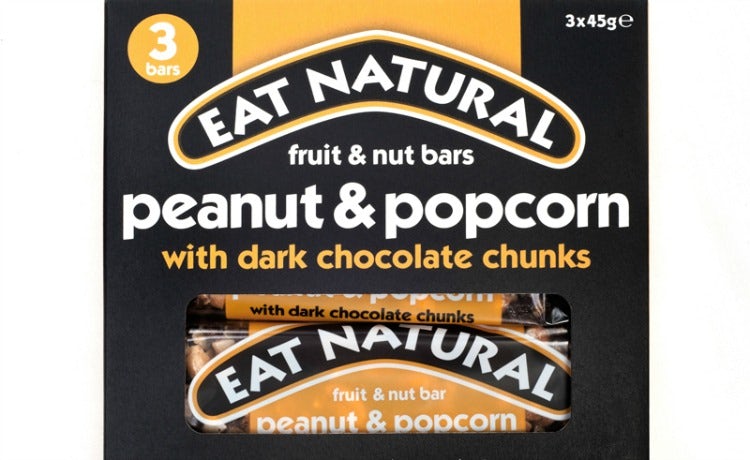Eat Natural on how it has built brand trust by not advertising
A production first, marketing second strategy has helped British snack bar company Eat Natural take a lead in the healthy living market over the past 20 years.

“We don’t consider ourselves to be an established player,” explains co-founder of healthy snack bar brand Eat Natural, Praveen Vijh.
“We have this mantra that we don’t have long five year plans, we’re just trying to live for today. It just sort of happens to be that we’ve been around for 20 years.”
Eat Natural started life in the summer of 1997, long before the clean living trend grew in popularity, when nut and dried fruit importer Vijh recognised the value-added potential of combining his raw ingredients into a healthy snack bar.
Sensing a gap in the market, the team took their early prototypes to small-scale exhibitions before branching out with their own production site in Halstead, Essex. Nicknamed the Makery, Eat Natural’s factory now produces 7 million bars a month all made by hand in batches of a 1,000. The brand employs close to 300 artisans who manufacture the bars, rolling out the ingredients by hand to the right shape and size.
From devising the initial concept in 1997 it took time for the team to get its gluten and preservative-free snack bars in front of the people who could help take Eat Natural to the masses.
“I remember saying to my colleague when we first started, ‘I’ll just call Holland & Barrett up and they’ll buy it straight away’. In fact it took around six years before Holland & Barrett actually started stocking our bars,” Vijh recalls.
The brand’s early play for the healthy snack market was clearly a wise move as consumer demand continues to soar. In the three months to March, 53% of UK consumers ate a cereal/snack bar, according to Mintel data. UK sales of breakfast biscuits and cereal/snack bars hit £523m in 2016, a market Mintel expects to reach £538m in 2017.
Eat Natural attributes much of its success to the traceability of its supply chain. The brand controls everything from managing the relationships with the fruit and nut growers to shipping the finished bars and designing the packaging.
“There are a lot of brands that are purely marketing driven. They take a product that is made by someone else, put their brand on it and they sell it on. That is totally opposite to the way we work,” Vijh explains.
“We are good at manufacturing, but we’re not that good at marketing, which has paid off in a way because consumers still view us as a discovery brand, even though we might be everywhere. Because we don’t advertise it actually builds up a kind of trust in the brand, as we’re not having to sell ourselves too much.”
Rather than high-profile ad campaigns, the focus is on allowing the product to shine and Eat Natural believes the best way to achieve this is through the packaging. The team deliberately opted for clear packaging in order to show shoppers the quality of the ingredients up close before they buy and to ensure they stood out from the competition at the point of sale.
Global goals
The UK currently represents 70% of Eat Natural’s business with 30% coming from exports, in particular to Europe where the team plans to push deeper into key markets such as the Netherlands, France, Germany and Scandinavia.
The aim is also to develop greater depth of distribution in the UK, securing more shelf space with tweaks to the existing product portfolio. Eat Natural has, for example, reacted to the increasing consumer interest in nutrition and the benefits of protein with the launch in March 2016 of Bars with Benefits, a range of three dairy, wheat and gluten-free bars naturally high in protein, fibre or omega-3.
Having performed “far better than expected”, Eat Natural now plans to expand the Bars with Benefits range over the next two years, focusing on what it sees as a growing trend for “positive nutrition”.

Reflecting on the past 20 years, Eat Natural does not see itself as consciously breaking new ground in the clean living space or paving the way for newer rivals like raw fruit and nut bar brand Nakd or US nut bar company Kind. Rather, Vijh regards the brand as a “guardian” of the healthy eating trend.
“I don’t think that I can claim any kind of brilliant plan. All we did was make a bar we thought tasted delicious and was an alternative to having a traditional chocolate bar,” he adds.
“We tried to make it cool to eat well. I don’t mean down with the lads in Hoxton, I mean that it was socially acceptable to eat something that was doing you some good. So I don’t think we broke new ground, but I think we were at the start of a trend.”
Going forward, Eat Natural is conscious that whatever new products it brings to market it wants to maintain the same inclusive tone of voice that has characterised the business over the past two decades.
“Our brand is very inclusive and direct in terms of talking to everybody. We just want to give you the facts and you make your own decisions. I think people are sick and tired of people preaching at them all the time,” adds Vijh.
“We do what we do, we create stuff that we like and if you like it then come on board with us, we’d love to have you, but we’ll never tell you what to do.”








